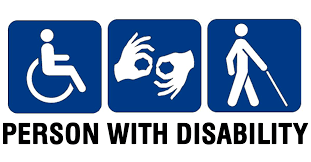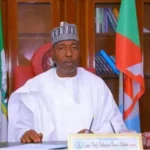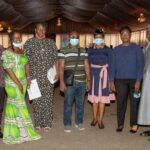In 2021, the Gates Notes reported that “a child in northern Nigeria is 20 times more likely to die before the age of five than a child in a rich country”. The high level of illiteracy combined with harmful gender and social norms are the major causes of this negative trend. Underneath is the people’s socioeconomic condition; there is an ever-increasing rate of poverty that subjects most families to the daily struggle for basic needs of life as food, water, medical bills, sanitation, and hygiene. Sadly, the rate of malnutrition and the economic condition of the people in Nigeria transcends regional boundaries.
Malnutrition is a major cause of morbidity and mortality among women and children. According to a UNICEF report, Nigeria has the second-highest burden of stunted children in the world, with a national prevalence rate of 32 percent of children under five. The report added that “an estimated two million children in Nigeria suffer from severe acute malnutrition but only two out of every 10 children affected are currently reached with treatment and only seven percent of women of childbearing age also suffer from acute malnutrition”.
The scourge of malnutrition spares no demography as the people living with a disability – especially women and children – grapple with an intricate issue of disability and malnutrition that is compounded by the country’s worsening economic condition. The intersectionality of nutrition and disability remains largely overlooked despite provisions of the Discrimination Against Persons with Disabilities (Prohibition) Act 2018 and the 2017 National Policy on Disability in Nigeria. People with Disability (PwD) are confronted with the challenges of poor access to healthcare services, poverty, low literacy, discrimination, and neglect from family members and society at large.
A recent World Health Organisation report indicates that approximately 35.1 million Nigerians are living with disabilities, with a significant proportion comprising women and children – facing discrimination and challenges that extend beyond individual struggles, affecting their families and communities at large. Pregnant women with disabilities, in particular, face consistent neglect that exposes them and their children to heightened risks of malnutrition. In nutrition programmes, this neglect is manifested in insensitivity to the peculiar needs of people with disability. For instance, accessing health and nutrition services is difficult because of lack of a disability-friendly environment or infrastructure, the absence of ramps, elevators, assistive devices, sign language experts, etc.
Beyond the absence of an inclusive infrastructure is the issue of the paucity of data for decision-making. Disability data is in short supply at local, state, and national levels, making policymakers oblivious to the need to decide through the lens of people with disability. Sometimes the discrimination of people with disability is perpetrated in the development of data collection tools. The attitude of some nutrition service providers towards people with disability does not help matters; they treat them with disdain because most of the providers lack training on disability inclusion. All these have led to unintended neglect and a missed opportunity to address discrimination issues concerning nutrition service delivery for people with disability.
The over 35.1 million Nigerians living with disability have the potential to add value to the economy of the country if they are empowered through increased access to health and nutrition services. It will increase their productivity and contribution to the country’s GDP, tax remittances, etc. A situation where they are left to wallow in abject poverty and poor access to health and nutrition services will only add to their unpalatable situation and limit the country’s economic growth. This understanding is part of the basis for the partnership between the World Bank, Niger State Government, and Plan International Nigeria in implementing the Accelerating Nutrition Results (ANRiN) project which brought to light, the daily realities of people with disability in the nutrition value chain. Having discovered multiple dimensions of discrimination against people with disability in delivering the community-based basic package of nutrition service in over 134 communities across 12 LGAs, the project proactively adopted a clustered targeting approach by identifying settlements that are predominantly populated by people with disability ‘Ungwan Nakassasu’, loosely translated as the land of disabled people in the Hausa language.
To avoid the discrimination of people with disability in nutrition service delivery schemes, there is a need for government, private sector, and international organisations to match policy and practice. This includes creating awareness, and advocating for policies and legislation to protect the rights of people with disability in all forms.
The establishment of the National Commission for People with Disability by the Federal Government of Nigeria in 2019 and the upshot of Disability Commissions in some States of the federation are all comforting developments. Almost all development organisations have a policy for including disability in their work, and operations. But it is not the end game. Ensuring that the people with disability in Nigeria have access to nutrition services will require bridging the gap between policy and practice. All stakeholders must join forces to dismantle discriminatory norms by creating inclusive infrastructures provided by the law to ensure that every individual, regardless of ability, has access to essential health and nutrition services.
ALHASSAN Hamza Hussaini is the Behaviour Change Communication and Campaign Officer with Plan International’s ANRiN project in Niger State. He wrote from Minna.

 Join Daily Trust WhatsApp Community For Quick Access To News and Happenings Around You.
Join Daily Trust WhatsApp Community For Quick Access To News and Happenings Around You.

